By Jerome Dingeldein
January 27, 2021 • 16 min read

We have conducted research to get a better understanding of how shipping quote requests are handled by various shipping companies in Europe.
More precisely, we approached 155 shipping companies which can be divided into two groups:
1. Domestic:
We requested quotes from 105 companies for a lane Waalwijk, Netherlands to Amsterdam, Netherlands.
More about pallet shipping Netherlands
2. International:
We asked 50 shipping companies for their prices for the lane Waalwijk, Netherlands to Goteborg, Sweden.
More about pallet shipping in Europe
The request consisted out of two price enquiries for the following services:
1. Less-than-truckload
2. Full-truckload
In order to understand and assess the shipping companies’ behavior properly , we took a look at the following factors
Learn more about pallet shipping
Our research shows significant variations between prices. The least costly spot rate from a shipping company is 73.22% lower than the most expensive offer.
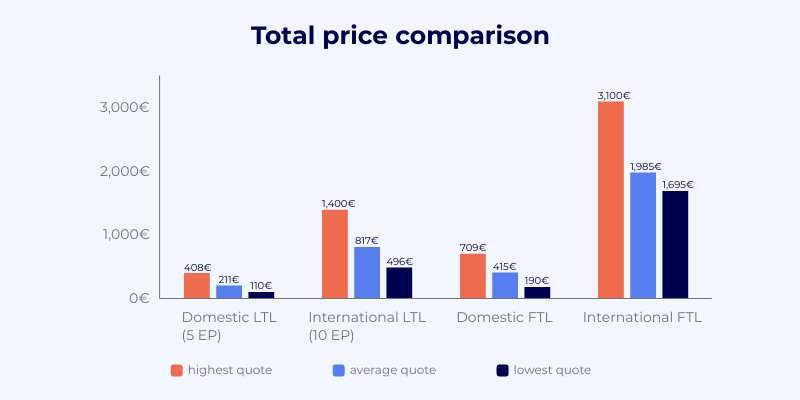
In the scope of our research, we calculated the average price per service and compared the price difference between highest and lowest quote.
The outcome may come as a surprise, as the shipping rates differed up to 270.45% for domestic LTL, with prices varying between 110€ and 408€ and an average of 211€.
The price range for domestic FTL varied even up to 273.36%, with rates going from 190€ all the way up to 709€.
Data suggests that shipping companies compute their shipping rates in very different ways, as some of them offer quotes that can be triple as high.
The price variations for international shipments were lower than domestic. Nonetheless, the most expensive quote for international less-than-truckload was 182.26% higher than the cheapest quote.
Interestingly, the range between quotes was least noticeable for International full-truckloads, with a difference of 82.89%.
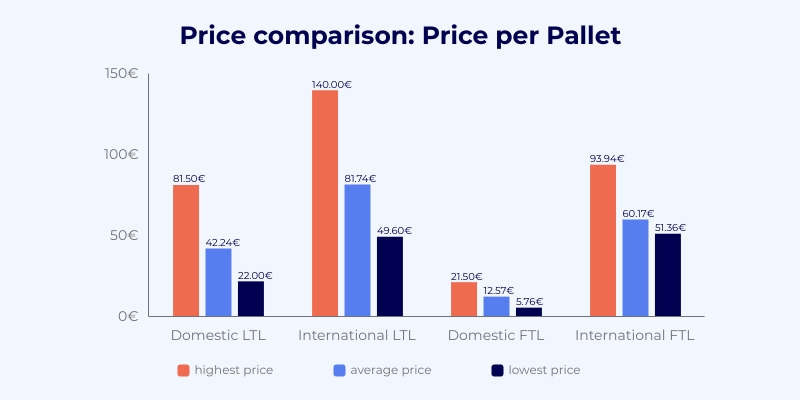
To enable better price comparison between the services, we additionally had a look at the cost per pallet.
Domestic FTL cost per pallet can be as low as 5,76€, whilst an international LTL shipment can drive the cost up to 140€ per pallet.
Interestingly, the lowest price per pallet for international LTL – 49,60€, is slightly lower than the lowest price per pallet for an international FTL shipment – 51,36€.
The results may indicate that shippers can really strike a bargain by requesting a quote with multiple international LTL providers.
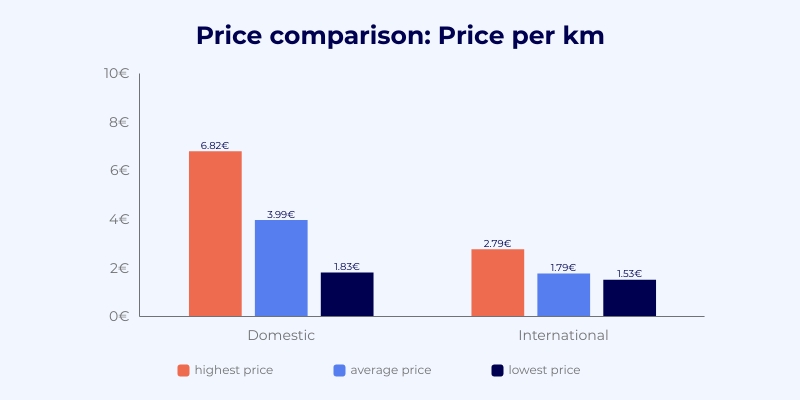
Lastly, we examined the cost per kilometer for full-truckloads.
As seen in the graph, the price range is significantly higher for domestic shipments, with shipping rates going from 1.83€/km up to 6.82€/km. A consequential difference of 272%.
Furthermore, the price per km for a FTL order to Sweden is 55% lower than the price per km for a domestic FTL shipment.
Key takeaway: Spot rate requests for both LTL and FTL – as well as domestic and international, lead to major differences in price between providers. The difference between the lowest and highest quote can be as high as 273%.
Calculate your freight cost with Quicargo
Companies often prioritize time over cost and quality nowadays. Therefore, we looked at how long shipping companies would take to respond to our quote request for a domestic shipment within the Netherlands.
Our research shows an average waiting time of 9.09 hours.
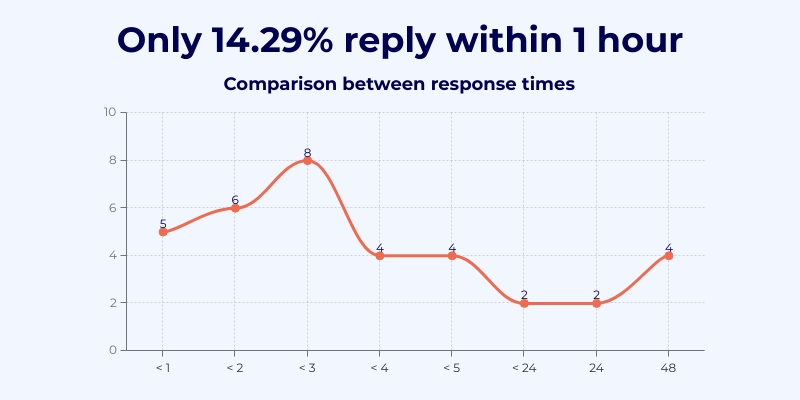
In many industries, such as textiles and fashion, the raw materials need to be shipped and processed within a tight schedule. Being slowed down by not getting a fast quote impacts the workflow and creates bottlenecks in a supply chain.
Nonetheless, only 14.29% of the approached companies for domestic shipments were able to provide price indications within an hour. 82.86% were able to reply within 1 day, while it took 17.14% up to 48 hours.
Key Takeaway: More than 85% of shipping companies do not respond to a shipping quote request within one hour.
In total we approached 155 with a quote request for two different shipments. However, only 54 out of those 155 shipping companies replied to our enquiry.
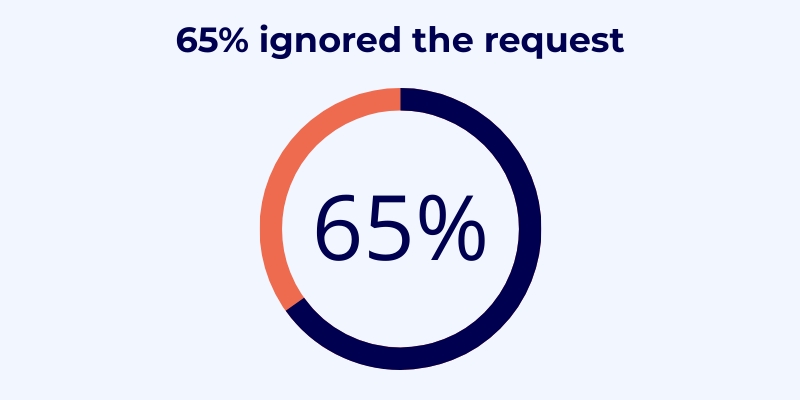
When requesting a quote, customers usually know what they want and are already far in the buying process. These leads can therefore be considered as ‘warm’ leads and can quickly transform into real customers.
Therefore, it may come as a surprise that the overall response rate is below 35%.
When distinguishing between the requests for domestic and international shipping services, data suggests that international requests tend to be handled more seriously than the domestic ones.
Domestic shipping quotes got a response rate of 32.38%, whilst the response rate for international shipments was slightly higher and amounted to 40%.
Key Takeaway: More than 6 out of 10 companies completely ignore quote requests.
Every request contained two orders: price indications for a LTL and a FTL shipment. Our analysis shows that only 17.4% of the shipping companies provided complete answers.
The following pie chart shows the distribution of all 54 received replies by category.
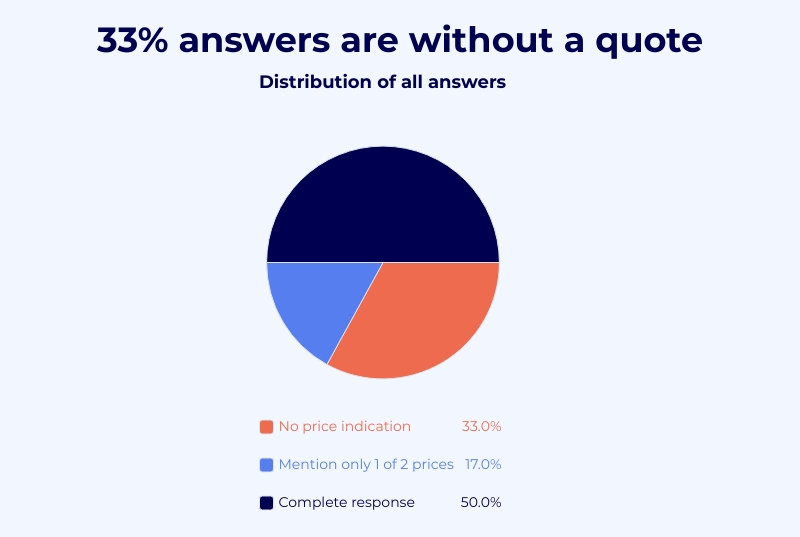
Whilst 50% of the responses gave a quote for both the LTL and FTL request, 17% offered a quote solely for one service and 33% answered without giving a price indication.
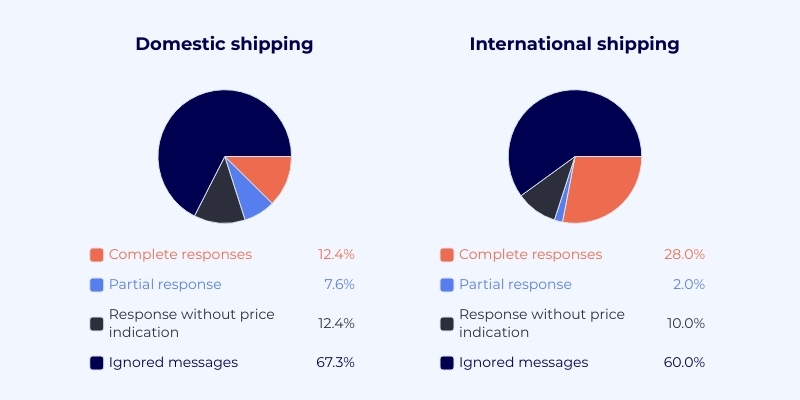
Similar to the responses, our data suggests that shipping companies seem more keen to respond to international requests..
Only 6 out of 20 international requests did not provide both quotes, meaning that 70% of all replies concerning the shipment to Sweden contained all requested information.
Looking at domestic order requests, only 38% of the 34 domestic replies contained both price indications.
Overall, the data points towards a lack of transparency about shipping rates, as only a small fraction of all companies approached provided a price indication for both requested services.
Key Takeaway: 50% of all responses were either incomplete or without any price indication. Requests for international shipments tend to be taken more seriously.
Our research shows that the traditional quote request will lead to
It is possible to circumvent such events by using digital shipping companies. Such service providers do not replace a traditional shipping company but rather function as the communication bridge between shippers and carriers (other shipping companies) while offering advantages for both sides.
In this case, choosing Quicargo as an intermediary instead of directly booking the pallet shipment with the transport company would lead to cost savings up to 30%. This is due to the fact that our algorithm smartly and efficiently connects shippers with empty truck capacity in the area.
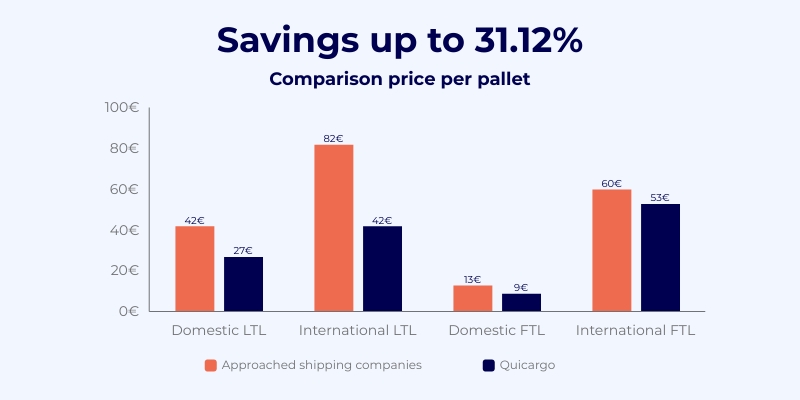
Companies are able to fill out a quote request at Quicargo, but in contrast to most approached shipping companies, Quicargo also offers direct spot rates for many lanes in Europe. This means that shippers do not have to wait for a response, and can calculate their spot shipping rate online in real-time. In addition, companies can book their shipment directly online for the indicated price, without any human interaction.
Moreover, service and customer satisfaction are key, which is why Quicargo takes the time to answer every single incoming request. In addition, clients with recurring transport are matched to dedicated customer success managers, who will answer questions and solve problems at any time.
Lastly, the digital freight network places special focus on full transparency. On the platform, the price is always clearly visible to the customer. By doing so, there are no billing ‘surprises’ for the shipper.
Ready to join a new generation of transport planners? Create your free account — no credit card required.
Start shipping
✓ 20.000+ Active Users ✓ Save 30% in Costs ✓ 100% Online






1 out of 2 trucks drive around empty or partially empty. A huge waste of resources.
Ship with Quicargo. Save costs, time, and CO2 emissions.
Explore the platform for free
You have already subscribed.
Join 12.000+ subscribers.
We're commited to your privacy. You may unsubscribe at any time.
